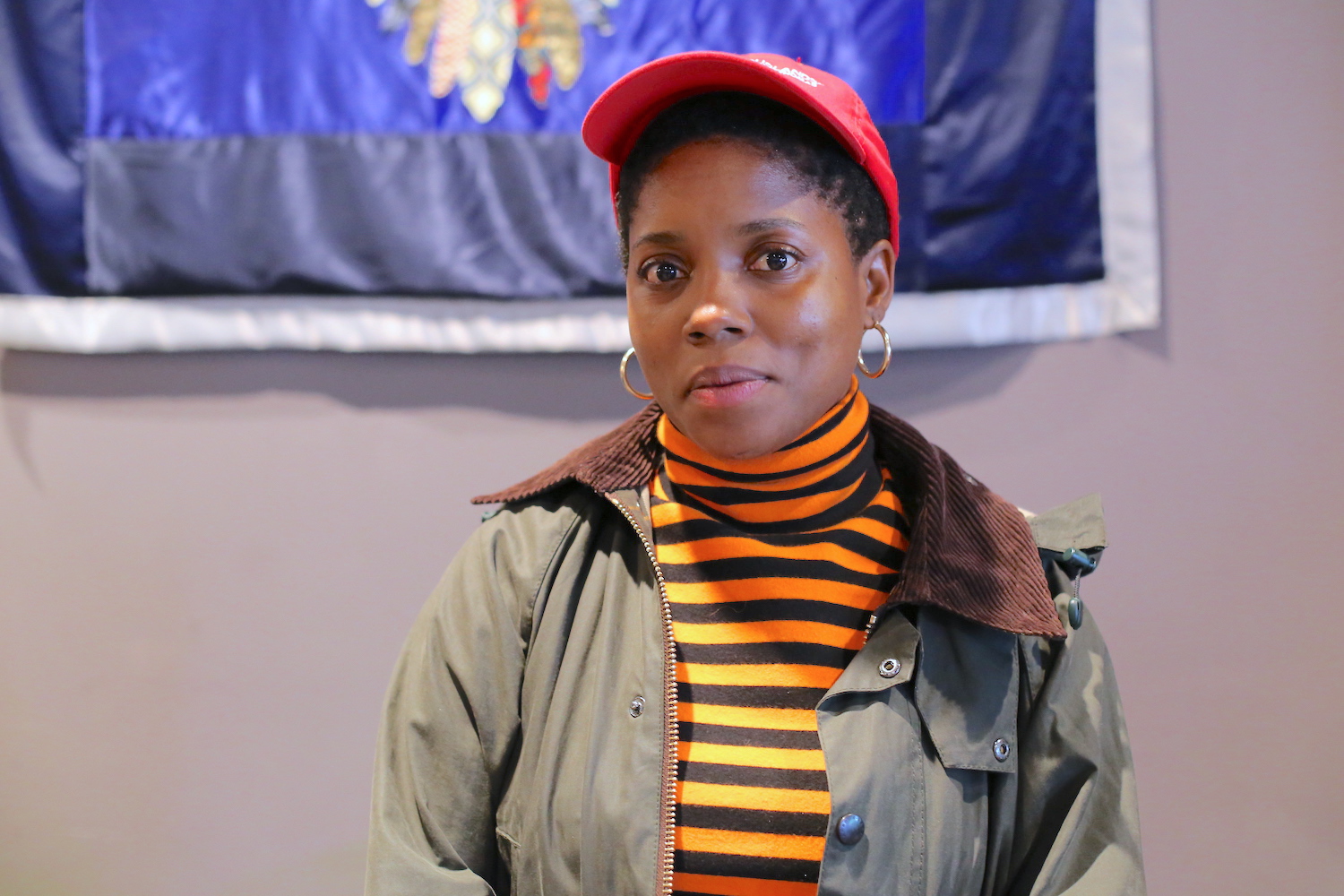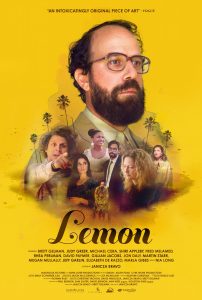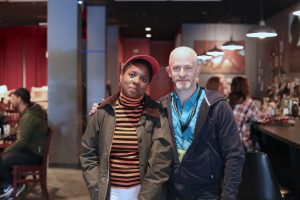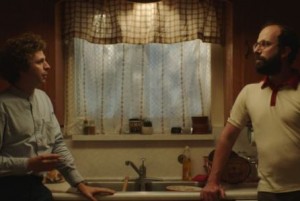A Conversation with Janicza Bravo (LEMON)

I met with director Janicza Bravo on Friday, May 5, 2017, at the Maryland Film Festival, where we discussed her first feature, the experimental narrative Lemon, which premiered at Sundance (and was reviewed at SXSW by our very own Don Simpson). Starring Brett Gelman as Isaac, an oddball drama teacher whose life unravels after his longtime girlfriend leaves him, it’s a delightfully surreal romp through the flip side of celebrity culture in Los Angeles. The film also features Judy Greer (as that girlfriend), Michael Cera and Nia Long, among others. Here is a condensed digest of our conversation.
Hammer to Nail: So I really enjoyed your film …
Janicza Bravo: Thank you so much!
 HtN: …but it’s definitely an odd film. There is this interesting, or weird, artifice of interactions and scenes, throughout, as if the whole movie is experimental theater like what Isaac puts on his classes. In a way, his mental breakdown throws him into one of his own weird dramas. Is it possible that the entire film is a fever dream?
HtN: …but it’s definitely an odd film. There is this interesting, or weird, artifice of interactions and scenes, throughout, as if the whole movie is experimental theater like what Isaac puts on his classes. In a way, his mental breakdown throws him into one of his own weird dramas. Is it possible that the entire film is a fever dream?
JB: I think that’s a really beautiful way to describe it! It is definitely absurd. I’m not sure what the experience of it is, but for myself, my background is in theater – in experimental theater, actually – and the film is a marriage of that work and hyperrealism. So, it’s operating on a plane that is near reality, but the language and its container and its blocking and its presentation is all theatrical … on purpose. So yes, that is correct. “Fever dream” is really sexy, though. I’m going to use that.
HtN: Good! Please! Feel free to steal it!
JB: Yes!
HtN: So, there’s definitely an intentionality, throughout, that clearly marks this as a singular vision. Nevertheless, I’m wondering: how did you and your star and co-writer, Brett Gelman, come up with this crazy story?
JB: We wrote Lemon five and a half years ago. We wrote the first draft five and a half years ago, actually at SXSW. The way that came to be was amusing. I was at a party – I think it was the opening night at the festival – and a couple of women had seen my first short film, which is called Eat, and stars Brett, along with Katherine Waterston…
HtN: I love Katherine Waterston.
JB: She’s…superb! And she was in my first short. So I forget, but it was within the first few days of the festival, and these ladies had seen my film and they really liked it and they asked if I had been…and it’s very theatrical, similar to Lemon, very presentational, mostly shot in proscenium, not a lot of coverage, and the language is pretty absurd, but very emotional and upsetting…and so they asked if I was working on a feature, and I lied and said, “Yes.” A friend of mine who was a filmmaker had said, “Say yes to everything. Don’t be your normal negative self.” (laughs) So, I said, “Yes,” thinking, “What did that mean? It was just a question, right?” And at the end of whatever this party was, one of them handed me a business card, and she worked for the Sundance Labs and asked to read a draft of the script because they were still accepting submissions for their summer lab. Now, this script didn’t exist…(laughs)
HtN: Small problem…
JB: …so I forced Brett into writing the script with me. I’d had a semblance of an idea of something that I wanted to work on, and we’d been playing and toying back and forth with working on something together. We had four pages of a script, and the next five days that we were at the festival, we wrote the first draft of the movie. It was terrible. We did not get into the lab. (laughs) But the positive thing – the silver lining – in all of that is that we had our template for the thing that we wanted to work on.
For me, the seed was that I felt I had been seeing a lot of work that was about a kind of protagonist that was male, white, late 30s/early 40s, a failure, who seemed to operate with very little-to-no consequence, had a solid partner, had a great group of friends, had a fantastic family, and lived in an apartment that seemed to be too large for this person to be living in based on how little they were outputting. And it was just like a fascinating kind of subject to me, because as a woman, and a person of color, that’s not a way that I could ever operate. I would never be able to operate in this way. And so Lemon, in some ways, is also my kind of experimentation in what this particular kind of male whiteness and privilege, in conversation with mediocrity, might look like, but setting it up so that there is not a win at the end. There is failure. Because that is the reality of what that journey should be.
HtN: So you’re basically making a film about Donald Trump.
JB: (laughs) Yeah! I guess so! Not on purpose! Who knew?
HtN: (laughs) Who knew? So, you’ve been working with Brett Gelman for a while…

Director Janicza Bravo and our Chris Reed
JB: This is our third or fourth collaboration. We’re together, romantically. We’ve been together for eight and a half years. Almost nine years. Lemon is our first foray into writing a feature. Our first collaboration was that short film, and then I’ve made six or seven short films over the last few years, and he is in a couple other of those pieces, but this was our first time actually writing together, and working in that way, which was challenging.
You know, it’s very hard to…it’s hard to work with people, anyway, in that way, it’s hard to write with people…and it can be really hard to write with someone who you’re romantically linked with. How do you not take the work home with you and also have this personal life together? Our styles are radically different, so it was complicated, but also fantastic. Neither of us had ever done that, so…and we did it again. We’re working on a television show together, so it’s like…we enjoy the sort of tortured aspects of it, I guess. (laughs)
HtN: If it works! That’s great.
JB: Yeah! I think it’s like a long foreplay, or something, I guess…(laughs)
HtN: Perfect! So…speaking of working with cast…I love your cast, even beyond Brett. We’ve got Michael Cera, and by the way, I love his hair…
JB: Inspired by Gene Wilder.
HtN: Yes! It looked very Gene Wilderesque! I’m just curious, did he grow it out, or is that a wig?
JB: He called me right before we were shooting, maybe like a few weeks before. And he knows I like large, ridiculous hair, though I’ve had a shaved head for 14 years.
HtN: [pointing to own head] I approve.
JB: But I like really big hair, and in the shorts I’ve made, hair is like a really important part. And he knew that, and so he called me up and said, “I’ve been growing my hair out for the movie. Do you want me to keep it? Or…” And he sent me a picture, and I was like, “Yes!” I’d been having this fantasy about him having this Young Frankenstein coif, and Judy Greer’s hair is also like Carol Kane’s 1970s style. So, yeah, there’s a lot of hairspiration. (laughs)
HtN: It’s fantastic, but how did you get all of these people? You’ve got Michael Cera, Judy Greer, Nia Long, Jeff Garland, Fred Melamed – perfect as Brett’s father – and Rhea Perlman, David Paymer, among others. How did you assemble the cast?
JB: There’s a couple of things. I feel the script is very strong. Michael, I had worked with before, so he was probably the easiest to get, and he was the first. I sent him a rough draft of the script five years ago. Those parts were written for Michael, Judy and Fred…and John Daly. And we sent them the script about five years ago – very early drafts of it – and they read and loved it. Michael had seen a short film that I wrote and directed, and he liked Eat, and we ended up collaborating on something together, so that was not the hardest road to get to. Judy…I used to be a stylist, and I had worked on a film that Judy was in, so I had become friendly with her. Fred Melamed, I loved in A Serious Man, and that movie is a movie that Brett and I obviously love, and when we’d seen it, we’d been like, “Oh my God! That’s your father!”
HtN: Yes, he’s great in that and in In a World…. I mean, he’s great in everything…
JB: He’s just superb. And his voice is just … I call him Fred Velvet. So, that was how we assembled that, and in terms of the rest of the cast, I would say Nia was probably the hardest person to get. I mean, I think she’s probably the most famous of the bunch.
HtN: Maybe her and Michael Cera, together.
JB: Yeah, but Nia is famous in a very different way. She’s been around for much longer, and she’s probably one of the most famous black actresses, which is just like another territory of celebrity.
HtN: Sure.
JB: And when I say she was the hardest to get, it’s because her world does not interact with mine. Whatever it is that my world is, it’s not Nia Long’s world. And so, I had one of our producers, or my agent, send the script to her people, and I was like, “Call her agent, and tell him that I am a black woman.” (laughs) And they were like, “That seems irrelevant.” And I said, “No. Tell. Her! She has to hear that.” And I kid you not, they called, they told him that, she read the script that day, and two days later, she and I met up, and ended up hanging out for six hours. And we had a lot in common. Her family is Caribbean, and our journeys were sort of similar, and our relationships with our families were very similar. And she felt, in her own words, that she had never been allowed to play in this kind of space, in what she considered sort of like a white comedy. And that it was helmed by me…it was exciting for both of us. 
HtN: Well, she’s wonderful.
JB: Thank you!
HtN: She’s so…her character is so funny. (laughs) No matter what Brett does, she can’t quite get rid of him.
JB: Yes! (laughs) He’s like a leech!
HtN: And she can’t quite bring herself, until he basically steals her grandmother, to firmly say no to him. So, let’s talk about the score now. Right from the beginning, it’s fascinating. It’s this sort of operatic score, and we wonder, “Is it diegetic? Non-diegetic?” How did you and composer Heather Christian come up with that sound?
JB: Heather is my longest collaborative relationship. I’ve been working with her since college. And so that’s like 16 years now. And this was our 9th or 10th film together. We used to do theater. And how we had approached the score for all of those pieces was to make music that did one of two things. It was either music for the space…so much of my work is very claustrophobic, and so often times the music was the space: Isaac’s apartment had its own sound; the family’s house, which is the bulk of the second half, has its own sound; and then in the third act, when you go outside more, then outside had its own sound, so there was that.
And then there was also instrumentation that was just him, like what sound is Isaac, if Isaac was an instrument? And in my other short films that Heather had scored, our protagonist always had an instrument that was them, and so, when you heard that instrument, it was sort of their voice, when they weren’t speaking. And I think with Isaac, it was the French horn. And that was how we built the piece together, with what the environment sounded like and what he sounded like, and having it communicate. It was better at communicating than he was. Isaac has a really hard time communicating, and so music, for us, becomes the narrator, in a way.
HtN: I like that. What a great description of your methods.
JB: Thank you!
HtN: Speaking of music, I love the “Million Matzoh Balls” scene.
JB: We had nothing to do with that! (laughs)
HtN: True! That’s a song that already existed, but I just liked that scene. So, along the line of the other oddities throughout your film, the editing stands out as one of the ways in which you throw things into turmoil. Could you describe your process of working with editor Joi McMillon?
JB: Joi is the first editor that I have ever really worked with. I should preface this by saying I’ve mostly edited my own shorts, and a few years ago I worked on this short film with an editor named Saela Davis, who cut this film called The Fits, and that was my first relationship like that. Editing is such an important part of the film, obviously. It is the film. (laughs) And so I’d had a really hard time letting go of that, and Saela had been really great at teaching me how to … it’s not “let go,” but actually playing with someone in the space. It’s really nice to have another person look at the work and not have you feel so horrible about it. (laughs) And so she sort of prepped me to have this relationship with Joi.
Joi and I met when I directed this short film a year or two ago called Man Rots from the Head, which is a black-and-white film about a salesman – and Michael Cera is in that, as well – and that was our first time working together, and it was intimate but short, and not as painful as I thought it was going to be, and so when it came time to work on Lemon, Joi just seemed like the obvious choice. She’s also a woman of color, and I liked having the presence of someone who has lived in a similar body as mine working on that film. It felt very right. And I just trust her, deeply. She was just nominated for an Oscar, for Moonlight, so she’s not a total dummy. (laughs)
HtN: That’s a very well-edited film.
JB: She and [co-editor] Nat Sanders did such a beautiful job! And so, similar to the music, we approached editing from the point of emotion. It was all very feeling-based, and so working from a place of how Isaac saw things. But when you’re in the second act of the film, the pace of the editing is a little bit different, because it’s on the parents’ terms, and so working from a place of, “Who has the power in this scene and who does not?” In the first quarter of the movie, [actress] Gillian Jacobs is cut off often, and so we would use the edit to do the thing that Isaac is doing to her. So how he feels is how we were editing, if that makes sense.
HtN: It does! And it’s a really fascinating film. Really enjoyed it.
JB: Thank you so much!
– Christopher Llewellyn Reed (@ChrisReedFilm)











